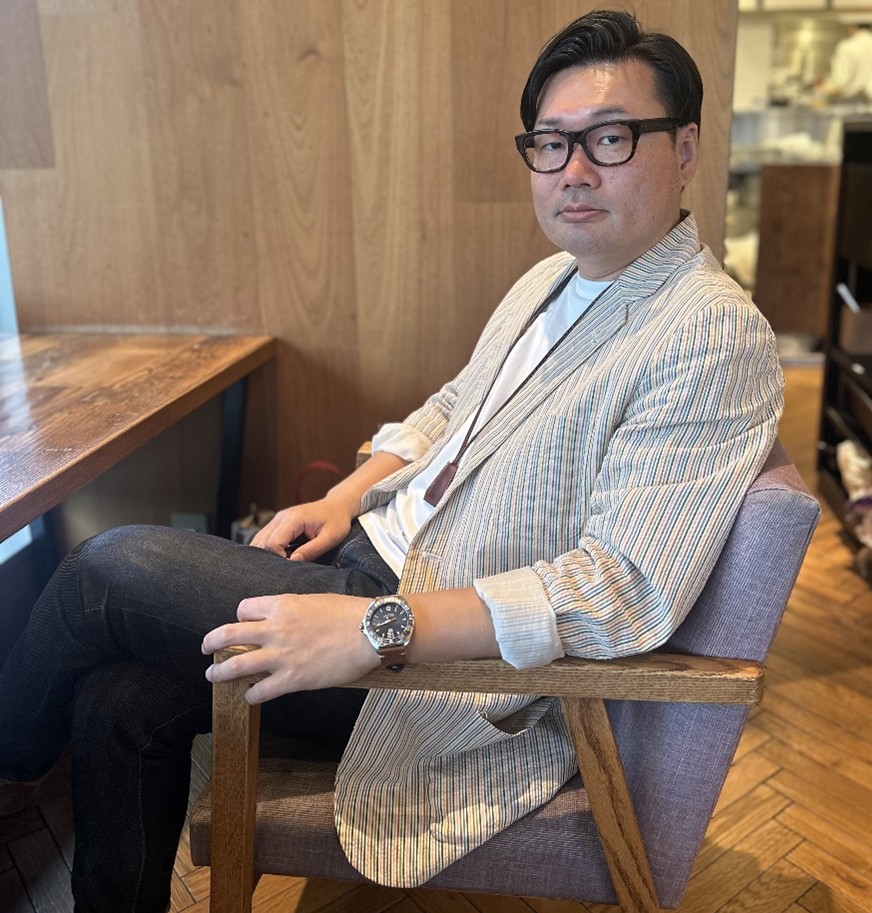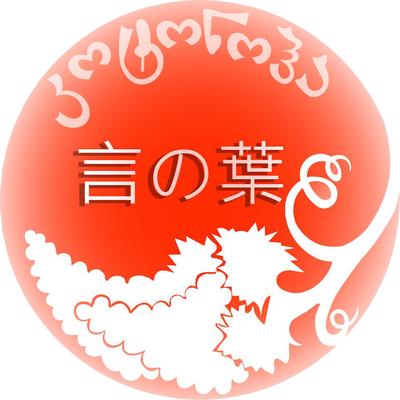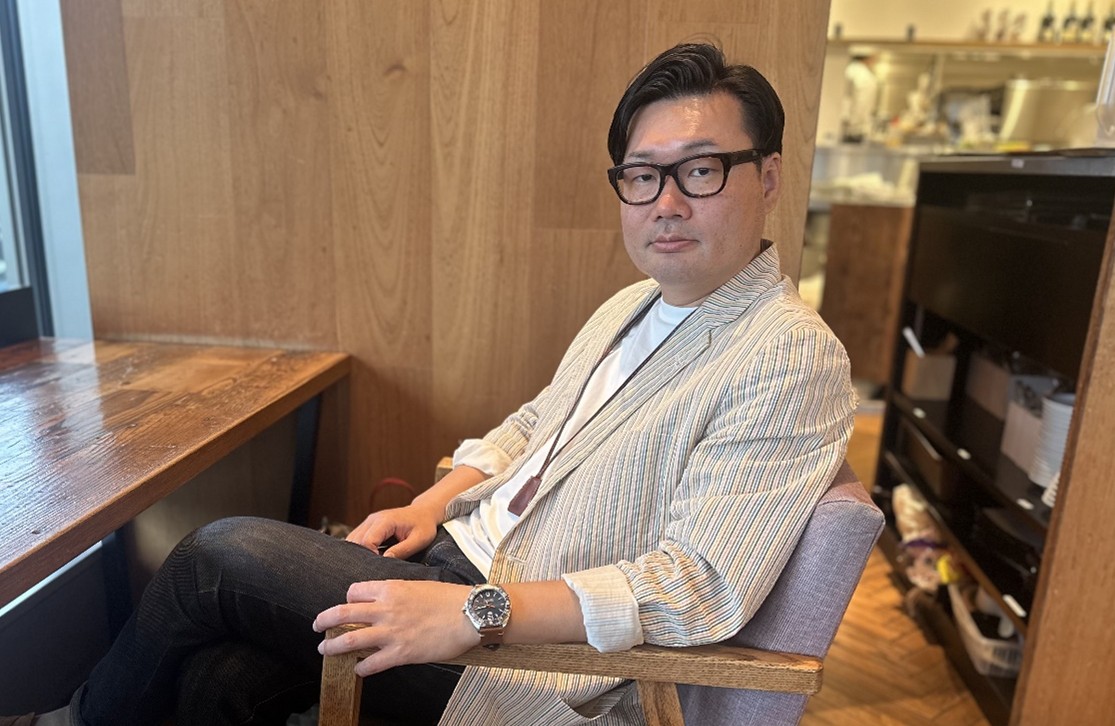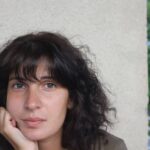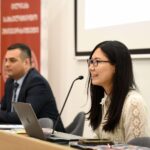【Profile】
Former Attaché at the Embassy of Japan in Georgia. Associate Professor at Waseda University Research Institute. Completed Doctorate at Osaka University Graduate School (Graduate School of International Public Policy)
――Why did you choose Georgia (then called “Gruzia”) as your mission place as a Attaché at the embassy of Japan?
Uchida: I could have chosen up to my second or third preference for the Attaché position in different countries, but I chose only Georgia. I had never been to Georgia, and I didn’t know the language, but I selected Georgia as my preferred destination. My approach to life has always been that when I find something I want to do, I focus on it entirely and put my all into it.
–Why did you choose Georgia as your sole focus?
Uchida: To tell an old story, the origin of my desire to work in international cooperation and peacebuilding began with the Great Hanshin-Awaji Earthquake. I was in junior high school at the time, and seeing rescue teams from distant countries like Switzerland come to help made me want to do similar work in the future. Later, when the conflict occurred in Georgia (then called “Gruzia”) in 2008, I was in graduate school. In graduate school, we did a role play about the conflict, and I was assigned to play the role of then-President Saakashvili. That was when I learned about the existence of Georgia. In 2010, when I was looking for job postings, I hoped to work on the ground in a post-conflict country. By chance, Georgia was an option for an Attaché position at the embassy. To be honest, I felt nervous. I thought working as an Attaché might be beyond my capabilities. But I decided to give it a try, and after thorough preparation, I was accepted.
–What was your first impression when you arrived in Georgia?
Uchida: I went to Georgia in February 2011. It was snowing. I stayed at a hotel near Freedom Square. It was pitch dark, and even though I went out to Freedom Square, I couldn’t see where anything was, not even along Rustaveli Avenue. The men walking around were all dressed the same, in jeans, leather jackets, and black shoes. Everyone had expressionless faces. My first impression was a mix of awe and concern about whether I could live and work there for two years.
–What was the most memorable experience during your two-year tenure as a specialist investigator at the embassy?
Uchida: Those two years were incredibly intense. Even now, I consider them the most intense and precious two years of my life. Ambassador Kamahara was very kind to me at the time. Toward the end of the two years, I even made appointments to meet with ministers and ambassadors from various countries. They trusted me and allowed me to undertake various tasks. Among those experiences, there are two that stand out the most. The first was the parliamentary election. The second was my farewell party when I left, held in the ballroom of what was then the Sheraton Hotel. Over 100 diplomats from various countries attended. One of the British diplomats told me, “This is a credit to you. The fact that everyone has come to say goodbye shows that you have worked hard over the past two years and that you have earned their trust and respect.” I was very pleased to hear that.
–Did you plan to write your doctoral thesis about Georgia before you were assigned there?
Uchida: No, I started to consider it after going to Georgia. During those two years, I gathered a lot of information and wanted to compile it in some way. Instead of just making it into a book, I thought that writing it as a doctoral thesis would also earn me a degree and open up an academic path. I became conscious of the doctoral program during my second year of assignment.
— So, those two years in Georgia became a turning point for you to move into the academic world?
Uchida: Absolutely. It was a turning point in my life. I never imagined it would turn out this way before going to Georgia. Life is mysterious, and you don’t know until you try. Therefore, I’m glad I went to Georgia, and afterward, I was able to conduct research with EU funding and go to Harvard University. The two years in Georgia were a very positive experience for me. It wasn’t just about career success, but about learning that overcoming fears and taking on challenges can lead to valuable experiences. Since then, I have no hesitation in taking on new challenges. Of course, there are risks and failures, but I learned the importance of challenging myself despite the risks. It truly changed my life.
— You have written various papers and books about Georgia. From an academic perspective, what aspects of Georgia interest you?
Uchida: Georgia is situated between the major spheres of influence of Russia and the EU, and from a realist perspective, it’s like a “vacuum.” There are very few countries placed in an environment where they constantly swing between the two sides due to the tug of war. This complexity makes Georgia challenging but also fascinating from a research standpoint. Additionally, there’s the character of the Georgian people. It’s hard to put into words, but when parliamentary elections were held in Georgia, I went to a village near Kutaisi. There, I saw an elderly woman in an election jacket, making every effort to conduct a democratic election. At that moment, I thought, “The future of this country is bright.” The people can be very emotional, but they are endearing, and this adds to the charm of Georgia.
— What do you talk to Japanese students about regarding Georgia at your university?
Uchida: I do not have any classes solely about Georgia, but there are some used as a case study. Current social interest is focused on Ukraine, and from there, I talk about the 2008 conflict in Georgia, the 2014 annexation of Crimea, and the 2022 Russian invasion of Ukraine. When studying countries like Georgia, I believe it’s crucial to adopt a realist approach. In the EU, the emphasis is on a liberal world, normative power, deepening interdependence, and a foundation of human rights and democracy. In developed countries, discussions tend to lean toward liberalism. Liberalism isn’t bad, and it’s something to aim for in the future, but introducing liberal ideas into places without the foundation can disrupt social order. Therefore, it’s important to analyze based on realism, and I believe societies will gradually move towards a liberal world as they mature. Seeing things through a realist lens can also be useful when looking at Japan
–Do you have any advice for those considering focusing their research on Georgia or the Caucasus region?
Uchida: Whether it’s regional studies or international relations, the approach may differ, but I want to emphasize the importance of actually going to the field. Scholars often tend to stay in their laboratories, reading books and writing. However, by going to the field, interacting with local people, and exchanging opinions with those involved in Georgia, you can learn a lot. There are things that cannot be conveyed through words but can be felt instinctively. Sometimes people say “yes” but their face says “no.” Therefore, it is important to get out of the laboratory and go to the field. Both theory and practice are crucial.
— Georgia was an important turning point for you. How do you plan to stay connected with Georgia in the future?
Uchida: I want to maintain my relationship with Georgia for life. I’m not sure exactly how, but after the Russian invasion of Ukraine, I’ve been invited to speak on TBS Radio and consulted by the Ministry of Justice. As a specialist in Georgia, and in a broader sense, covering the greater Eastern European flow, including Ukraine and the Caucasus region, there are people who want to hear about these topics. I wish to contribute by speaking to such audiences. If possible, I would like to visit Georgia every year. I believe I can help raise awareness of Georgia in Japan. I am critical of the Georgian government at times. I don’t necessarily praise Georgia unconditionally. But I hope to contribute by providing factual information to help the country improve through democratization. As a foreign perspective, I hope it can also be helpful to Georgians.
